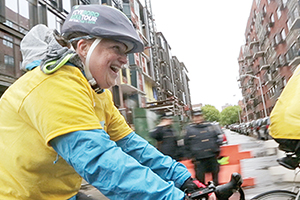By JULIE MINDA
Staff and patients of Calvary Hospital of Bronx, N.Y., are among those profiled in a documentary on end-of-life decision-making. The film Defining Hope had a limited release in November and is available broadly this month.
The documentary follows patients with life-threatening illness as they make choices about how they want to live their lives, what medical interventions they will pursue or accept, what their hopes are and what their priorities are, in the face of imminent death. A focus is on the nurses who provide care to the patients and help them with their decisions. Calvary Hospital is one of several hospitals and other care facilities featured in the documentary. The 225-bed, two campus Calvary Hospital is the nation's only acute care specialty hospital devoted to palliative care.
Calvary Hospital nurse Diane Ryan is prominently featured in Defining Hope. The viewer sees Ryan providing care to patients and contending with her own serious illness. Ryan is receiving treatment for cancer.

Diane Ryan, a nurse at Calvary Hospital in Bronx, N.Y., is shown biking in New York City in this still from Defining Hope, a documentary on end-of-life care and care choices.
The documentary captures Ryan's glee as she finishes a 40-plus mile bike ride around New York City. "I'm not afraid to die," she says in a voice-over in the documentary. "I've never been afraid to die. It's how we're going to die, and I don't think I want to be on a bed sick as a dog."
This is the second project by award-winning documentary filmmaker Carolyn Jones and her crew to highlight Calvary Hospital. Jones included Ryan and fellow Calvary Hospital nurses Marilyn Crockett and Andrea Mejia in a multimedia project called Dying in America: Nurses Leading the Conversation, that debuted last year. That project includes interviews with nurses delivering end-of-life care, and resources for people making end-of-life decisions, all now posted on a website, dyinginamerica.org/about/. That project led to Defining Hope.
Barbara J. Nitzberg directs public affairs and community relations for Calvary Hospital. She said Calvary Hospital was drawn to Jones' Dying in America project and agreed to be part of the Defining Hope film because Jones' philosophy aligns with that of Calvary Hospital. Nitzberg said, "We recognized that we had the opportunity to work with a partner who wanted to show another side of the end-of-life experience — that this sacred time can be very life-affirming and joyful, not just a time of sadness."
Jones says her work with Calvary Hospital for the Dying in America project convinced her and her crew that Calvary Hospital was particularly effective in addressing patients' end-of-life needs in a holistic way.
Jones and her production crew spent seven days filming for Defining Hope at Calvary over the course of a year and half, mostly following Ryan as she cared for patients. The crew spent another four days shadowing Ryan outside of work including on the bike ride and undergoing cancer treatment at a hospital.
Information on Defining Hope is available online at hope.film/. It has been screened in theaters in cities across the U.S. over the last few months, and screenings will continue for the next several months. It is available on DVD and on digital television On Demand platforms this month and will air on some PBS stations beginning in April.
Calvary's Nitzberg said, "We hope that when people see Defining Hope, they will better understand that we all have choices in how we want to live. How we die is one of the choices we can influence, if we are fortunate and if we plan. After people see the film, we hope they will decide to make advanced directive plans well ahead of time."
She added, "Calvary wants to help shape the national conversation on end-of-life care and what we need to do to improve it for all Americans."
Copyright © 2018 by the Catholic Health Association
of the United States
For reprint permission, contact Betty Crosby or call (314) 253-3490.